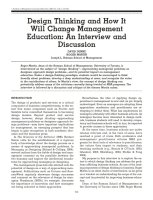
Design Thinking and How It Will Change Management Education by David Dunne and Roger Martin

Read the summary below and get the key insights in just 10 minutes!

What if business schools taught students to think like designers? In 2005, award-winning educator David Dunne interviewed Roger Martin – then dean of the University of Toronto’s Rotman School of Management – about his idea to put “design thinking” at the center of business education. Design thinking and its focus on collaboration, empathy and integrative thinking no longer seems as radical a business idea today. Nonetheless, getAbstract recommends this interview and Dunne’s elaboration to those considering an MBA program, to those leading MBA programs and to business school recruiters.
[/text_block]

- Why business students need to think like designers,
- Why the current business education model falls short and
- How “design thinking” can improve business education.

Business education faces extensive criticism from current academic and business leaders. Many believe that its values and teaching methods are no longer relevant to today’s workforce and economy. “Design thinking” has the potential to address many of the criticisms of business education, such as lack of innovation and social responsibility.
“In conventional management thinking, constraints are seen as an undesirable barrier to the generation and implementation of ideas; for a designer, however, constraints are embraced as the impetus to creative solutions.”
Business students should learn to think like designers. They need to create fresh ideas through “abductive reasoning” – that is, thinking about “what could be” rather than “what should be and what is.” They need to learn to work in teams: In today’s business schools, working together too often means like-minded people collaborating on a project. Business students learn how to craft solid lines of arguments in defense of their positions. They don’t learn to listen and to understand fully another person’s point of view, which is crucial for true collaboration.
“We teach a very narrow form of collaboration, which is to find somebody who thinks like you and then work together. I don’t think we teach students to really dig deep and to understand somebody else.” (Roger Martin)
Students need to acquire “skills of observation and inquiry” so they can thoroughly get to know their users and understand how they experience a product or service. Teachers train business students to prove ideas, but not to appreciate conflicting ideas. In a design-based approach, students consider the whole picture of a given project. They don’t value only shareholder interests, but consider both what is economically viable and what is socially just. Traditional management firms treat workflow as one continuous project, which often ends up being expensive and overstaffed. In contrast, a design-inspired paradigm divides workflow into individual projects that revolve around constraints and complex challenges, which inspire innovative solutions.
Incorporating design thinking in business education necessitates significant changes to current programs. Many of the tools that business schools teach remain relevant, but design thinking should become the underlying model. Teachers may struggle to accept a new, comprehensive and pluralist framework, and the general success of business programs will slow down necessary change. Although the proposal may seem radical, considering the state of business education, design thinking is perhaps one of the more viable solutions.
[/text_block]

Roger Martin is director of the Martin Prosperity Institute of the University of Toronto’s Rotman School of Management. David Dunne is co-director of the Rotman Teaching Effectiveness Center.
[/text_block]

Get key insights from 15,000+ non-fiction books at GetAbstract.com.
[/text_block]




